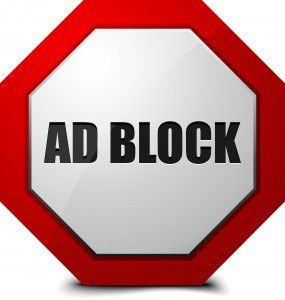In this blog post, Abhiraj Thakur, a 1st-year student of NALSAR University of Law writes about the legality of ad blocking software. This software is widely used by internet users all over the world today as they find it convenient to block the ads which hamper the speed of the network. At the same time, the websites that are blocked claim it to be the infringement of their copyright. The legality of these ad blocking software has been subject to much debate since the internet boom.
When we open a web page, we sometimes come across color snippets of different sizes appearing or to say popping up on the screen. These snippets invariably show us something to buy or subscribe or for that matter they are advertisements. However, sometimes we also find some pages suddenly opening up by them containing ads, which in turn slows down the loading of the page we want and so we are annoyed, and we block these ads using ad blocking software available. This routine process of blocking or staying away from promotions by viewers is not another new thing; it is in pervasiveness since TV reached homes of people. This process of people voluntarily opting to avoid television advertisements is popularly termed as “Commercial Skipping”.
Legality of Commercial Skipping
While India has still not seen any cases similarly as Commercial Skipping is concerned, the courts in the United States have had various chances to manage such cases including promoters and individuals required in the matter of creating advances which give the viewers the choice, or the power to avoid advertisements.
US courts for the first time tussled with the issue of business hindering on account of Sony versus Universal Studios Inc.[1] The VCR(Video Cassette Recorder) created by Sony gave an alternative to the clients to record the TV program and avoid the promotions amid playback. TV and film studios attempted to battle that Sony must be held contributory at risk for copyright encroachment for assembling video tape recorders, which, by the goodness of empowering clients to make video tape recordings of TV projects, would likewise empower them to skirt the plugs amid playback. These contentions were however dismisses by The Government Court, which held that Sony couldn’t be held contributory at risk for an element of the VCR that was assistant to its honest to goodness target that is the capacity to participate in time moving and record a TV program with the end goal of watching it at a later date.
 Another case is of Replay TV.[2] Replay TV had arrangements to incorporate into its DVR, a component called Commercial Advance, which would permit viewers to naturally skip advertisements. It was this element that was the premise of a claim against Replay TV, conveyed by media organizations trying to challenge the lawfulness of Commercial Skipping. It should be seen that the unmistakable component of Replay TV’s Commercial Advance development was that it conveyed on the DVR to delete advertisements consequently while recording, so that amid playback, a viewer would not see any advancements at all amid a business break.
Another case is of Replay TV.[2] Replay TV had arrangements to incorporate into its DVR, a component called Commercial Advance, which would permit viewers to naturally skip advertisements. It was this element that was the premise of a claim against Replay TV, conveyed by media organizations trying to challenge the lawfulness of Commercial Skipping. It should be seen that the unmistakable component of Replay TV’s Commercial Advance development was that it conveyed on the DVR to delete advertisements consequently while recording, so that amid playback, a viewer would not see any advancements at all amid a business break.
The Court in Sony surrendered that clients may quick forward through advertisements amid playback and that settling on such a decision was not unlawful in that it didn’t adjust or abuse the copyright of the project as it was being telecasted. The premise of the contention against ReplayTV depended on a presumption made by the Sony Court: that methodically quick advance through ads was ‘excessively dull a movement, making it impossible to genuinely represent a risk.’Here, the offended parties contended that the Commercial Advance element made Commercial Skipping exponentially simpler and along these lines ought to be viewed as an encroaching action. They encourage contended that Replay TV’s elements assault the major financial underpinnings of free TV and essential non-show administrations. Promoters won’t pay to have their commercials put inside TV programming conveyed to viewers when the notices will be undetectable to those viewers.
An examination of these cases makes one thing clear; promoters don’t have an issue when viewers of their volition skip advertisements, and regardless of that fact every one of us does it at our homes constantly. A large number of us intentionally arrange our exercises, when our most loved show is on air, to do them amid the promotion breaks. So where precisely does the issue lie for the publicists? The issue for the promoters lies in the accessibility of such an innovation at the transfer of the viewers which empower them to totally remove the notices from their review experience.
Copyright Encroachment of a Site
With the web now turning into the significant wellspring of amusement and data for the general population everywhere, sponsors will undoubtedly run to the web to publicize their item and administrations. The issue on the internet begins with the accessibility of innovation which totally disposes of ads from their web searching background. The accessibility of promotion blocking programming which gives the web clients the fundamental apparatus to maintain a strategic distance from notices in-all is frequently seen as an encroachment of the copyright of the website admin.
This was the premise for cases which as of late happened in Germany against Eyeo GmBh (The organization that has made the most renowned advertisement blocking programming Ad Block Plus), alongside having some case under the German Competition Law also. As a major aspect of the decision, the Hamburg region court rejected the daily paper’s contention that Ad Block Plus was meddling in an agreement peruses were going into with the daily paper that included tolerating advertisements and held Ad hindering in-all to be legitimate. The German case conveys light to the issue the significance of Commercial Skipping in the web age, and this makes for an intriguing civil argument in the matter of how might Commercial Skipping would be dealt with under the Indian Copyright Act, 1957.
In any case, before diving into the Indian framework let us first observe how the Commercial Skipping is taken a stand at in the copyright administration of US.
U.S. Position
The present contention against Commercial Skipping in the US depends on a hypothesis of copyright encroachment.
If there should be an occurrence of WGN Continental Broadcasting Co. v. Joined Video, Inc.,[3] the court gave the premise to Commercial Skipping as an infringement of copyright:
“A copyright licensee who ‘makes an unapproved utilization of the basic work by distributed it in a truncated form’ is an infringer-any ‘unapproved altering of the fundamental work, if demonstrated, would constitute an encroachment of the copyright in that work like whatever other utilization of a work that surpassed the permit allowed by the proprietor of the copyright.”
 Here, the sites influenced by Ad Block Plus would claim the individual client is making an unapproved subsidiary when he utilizes a promotion blocking programming to expel notices from the format of the site. To demonstrate contributory copyright encroachment, an offended party would need to encourage demonstrate the respondent’s (Ad Block Plus’) conduct fulfills the accompanying three components:
Here, the sites influenced by Ad Block Plus would claim the individual client is making an unapproved subsidiary when he utilizes a promotion blocking programming to expel notices from the format of the site. To demonstrate contributory copyright encroachment, an offended party would need to encourage demonstrate the respondent’s (Ad Block Plus’) conduct fulfills the accompanying three components:
- support in the encroachment,
- goal to actuate to encroach,
- and a creation of the method for encroachment.
Fulfilling these components would not be troublesome; fulfilling the main component would just require the offended parties to recognize a direct infringer who utilized Ad Block Plus to thwart advertisements from showing up on the Web web page. Finding a person who got to the Web website being referred to while using Ad Block Plus ought not to be excessively hard, given the quantity of individuals who have apparently downloaded and introduced Ad Block Plus. Next, the offended party must demonstrate that the makers of Ad Block Plus had learned that its item was being utilized to encroach upon another’s copyright. If Ad Block Plus had a critical non-encroaching utilize, an offended party would need to demonstrate that not just did Ad Block Plus have helpful information that its clients were using the item for an encroaching reason, yet that it incited people to use its item to encroach. Nonetheless, because the sole motivation behind Ad Block Plus is to piece ads from sites, consequently making an unapproved subsidiary, the Court in Grokster10 insinuated that an appearing of actuation may not be vital, and verification of valuable learning would be adequate. Given the notoriety of Ad block, Plus-it was incorporated into PC World’s 100 Best Products of 2007 Show; it is exceedingly improbable that the maker is ignorant that there are individuals who are utilizing the project to piece promotions.
Indian Position
 In India, the position is somewhat diverse. The sites when all is said in done are not conceded any assurance but rather once the creativity basis is fulfilled it is allowed insurance as an “artistic work.” Sites are conceded security as indicated by the substance which they have on their site, henceforth, for each of the substance they need to record separate copyright application.
In India, the position is somewhat diverse. The sites when all is said in done are not conceded any assurance but rather once the creativity basis is fulfilled it is allowed insurance as an “artistic work.” Sites are conceded security as indicated by the substance which they have on their site, henceforth, for each of the substance they need to record separate copyright application.
It can further be said that the promotions make a part of the site and are introduced in the structure chosen by the Registrant of the site to the client. Any change, deduction or adjustment in the site by hindering the notices might be considered as an encroachment of the result of the site proprietor/registrant rights over its site.
In this manner, Commercial Skipping may be equivalent to encroachment in India. The Plaintiff will need to build up the commitment of Ad Block Plus in the encroachment as the essential infringer might be the client who energetically utilized the components of the Ad Block Plus as under different purviews.
However there being a lack of judicial precedents in India about commercial skipping it would be wrong to make a premature assumption about the interpretation by Indian judiciary of the provisions of laws. Ad blocking is on a constant rise in India as well. The latest estimates stating the number of users to be between 2-4 million,[4] thus it becomes pertinent to look forward how the Indian judiciary will deal with the issue of the legality of Ad blocking.
[divider]
Footnotes
[1] 464 U.S. 417 (1984)
[2] https://freeexpression.in/2016/03/legality-of-ad-block-software-in-websites/
[3] 693 F.2d 622 (1982)
[4] http://www.livemint.com/Consumer/5bcehCufiNvivo5PZpdRHP/The-rise-of-ad-blocking-software-in-India.html
 Serato DJ Crack 2025Serato DJ PRO Crack
Serato DJ Crack 2025Serato DJ PRO Crack











 Allow notifications
Allow notifications


